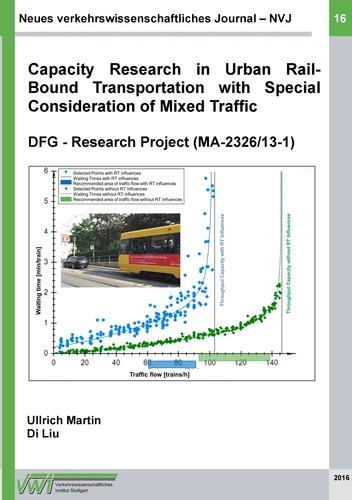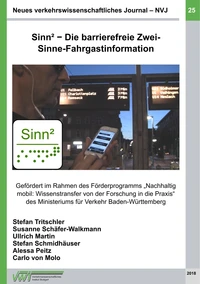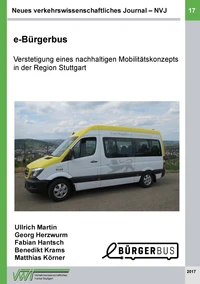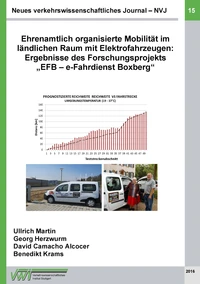Neues verkehrswissenschaftliches Journal - Ausgabe 16. Capacity Research in Urban Rail - Bound Transportation with Special Consideration of Mixed Traffic
Par : ,Formats :
Disponible dans votre compte client Decitre ou Furet du Nord dès validation de votre commande. Le format ePub est :
- Compatible avec une lecture sur My Vivlio (smartphone, tablette, ordinateur)
- Compatible avec une lecture sur liseuses Vivlio
- Pour les liseuses autres que Vivlio, vous devez utiliser le logiciel Adobe Digital Edition. Non compatible avec la lecture sur les liseuses Kindle, Remarkable et Sony
 , qui est-ce ?
, qui est-ce ?Notre partenaire de plateforme de lecture numérique où vous retrouverez l'ensemble de vos ebooks gratuitement
Pour en savoir plus sur nos ebooks, consultez notre aide en ligne ici
- Nombre de pages156
- FormatePub
- ISBN978-3-7431-4760-7
- EAN9783743147607
- Date de parution09/03/2017
- Protection num.pas de protection
- Taille6 Mo
- Infos supplémentairesepub
- ÉditeurBooks on Demand
Résumé
In urban mixed traffic zones, urban rail-bound transport interacts with road traffic, which includes motorized road traffic as well as non-motorized road traffic. The quality of operation and the capacity of urban rail-bound transport are heavily influenced by the road traffic in urban mixed traffic zones. Capacity research is one of the most important methods for the validation of timetables on an existing or planned infrastructure, for adequate railway capacity design of the infrastructure, as well as the performance evaluation for railway operation.
For the urban mixed traffic zones, two developed approaches in this research can be used to carry out capacity research with consideration of the road traffic influences on urban rail-bound transport. As a result of the stochastic influences of road traffic on urban rail-bound transport, the waiting time function will be adapted to mixed traffic conditions, which can derive the recommended area of traffic flow for the situation of urban mixed traffic more plausibly.
In addition, an algorithm for modeling an event-driven system is developed for preliminary determining the results of capacity research. Accordingly, the operating performance for urban rail-bound transport with road traffic influences can be determined and evaluated.
For the urban mixed traffic zones, two developed approaches in this research can be used to carry out capacity research with consideration of the road traffic influences on urban rail-bound transport. As a result of the stochastic influences of road traffic on urban rail-bound transport, the waiting time function will be adapted to mixed traffic conditions, which can derive the recommended area of traffic flow for the situation of urban mixed traffic more plausibly.
In addition, an algorithm for modeling an event-driven system is developed for preliminary determining the results of capacity research. Accordingly, the operating performance for urban rail-bound transport with road traffic influences can be determined and evaluated.
In urban mixed traffic zones, urban rail-bound transport interacts with road traffic, which includes motorized road traffic as well as non-motorized road traffic. The quality of operation and the capacity of urban rail-bound transport are heavily influenced by the road traffic in urban mixed traffic zones. Capacity research is one of the most important methods for the validation of timetables on an existing or planned infrastructure, for adequate railway capacity design of the infrastructure, as well as the performance evaluation for railway operation.
For the urban mixed traffic zones, two developed approaches in this research can be used to carry out capacity research with consideration of the road traffic influences on urban rail-bound transport. As a result of the stochastic influences of road traffic on urban rail-bound transport, the waiting time function will be adapted to mixed traffic conditions, which can derive the recommended area of traffic flow for the situation of urban mixed traffic more plausibly.
In addition, an algorithm for modeling an event-driven system is developed for preliminary determining the results of capacity research. Accordingly, the operating performance for urban rail-bound transport with road traffic influences can be determined and evaluated.
For the urban mixed traffic zones, two developed approaches in this research can be used to carry out capacity research with consideration of the road traffic influences on urban rail-bound transport. As a result of the stochastic influences of road traffic on urban rail-bound transport, the waiting time function will be adapted to mixed traffic conditions, which can derive the recommended area of traffic flow for the situation of urban mixed traffic more plausibly.
In addition, an algorithm for modeling an event-driven system is developed for preliminary determining the results of capacity research. Accordingly, the operating performance for urban rail-bound transport with road traffic influences can be determined and evaluated.






